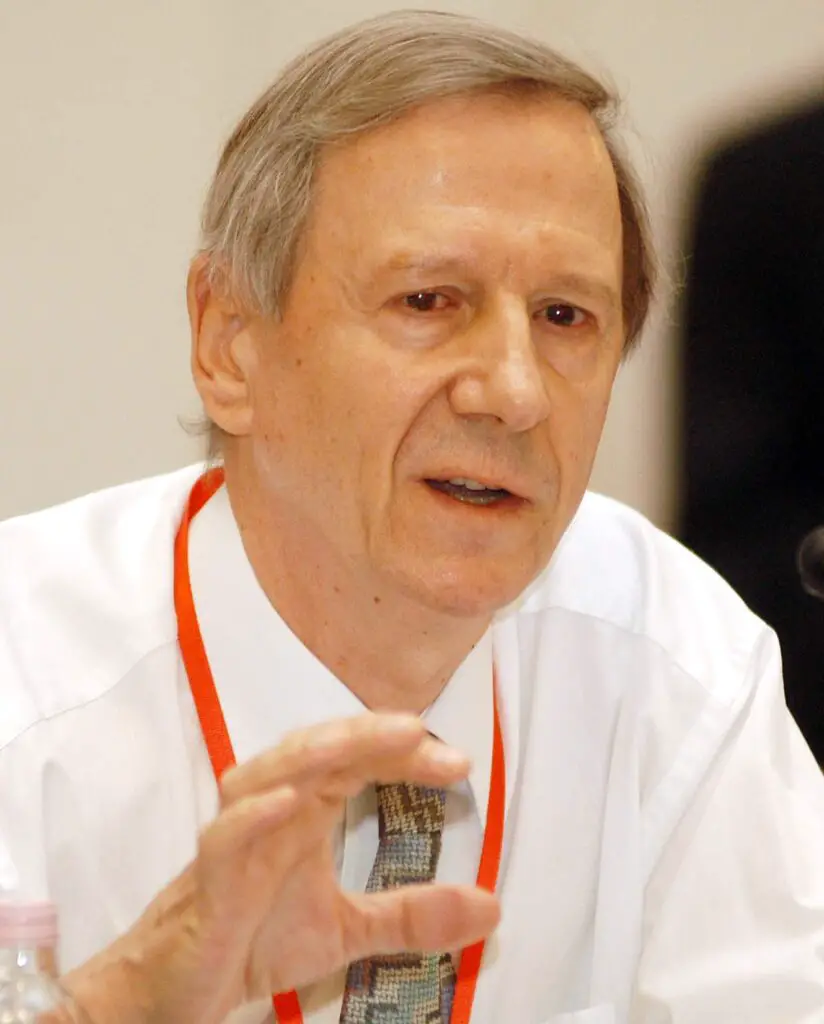Anthony Giddens (born 18 January 1938) is a leading British sociologist whose work has profoundly shaped contemporary social theory. He is widely regarded as one of the most important and influential social theorists of the late 20th and early 21st centuries. Over his career, he has published roughly 40 books and hundreds of articles, addressing the deepest questions of modernity, globalization, and social change. Giddens’s writings are known for linking classic sociological ideas with contemporary issues, and for blending theoretical rigor with engagement in public policy debates.

Early Life and Background
Giddens was born in Edmonton, North London, in 1938. He grew up in a modest, lower middle–class family, and was the first person in his family to attend university. These early years in postwar Britain instilled in him an acute awareness of social inequality and class. According to Giddens himself, he remains a dedicated supporter of his local football club, Tottenham Hotspur – a small personal detail that has become part of his public persona. His background – local grammar school education, humble origins – and early interest in sport and culture (as evidenced by his student dissertation on sport and society) foreshadowed the breadth of his later sociological interests.
Education and Academic Training
Giddens pursued formal education in sociology and related fields. He earned a B.A. in Sociology (also studying Psychology) from the University of Hull in 1959, and then obtained an M.A. from the London School of Economics in 1961. At LSE he wrote a dissertation on “Sport and Society in Contemporary Britain,” reflecting an early engagement with culture and social institutions. He later completed his doctorate at King’s College, Cambridge (awarded in 1976). His Ph.D. work was deeply informed by the major sociological debates of the mid-20th century.
After graduating, Giddens began teaching social psychology at the University of Leicester in 1961. It was at Leicester that he began developing his own theoretical ideas. In the early 1970s he moved to King’s College, Cambridge, where he became Professor of Sociology in the Faculty of Social and Political Sciences. During his Cambridge years he also co-founded the scholarly publishing house Polity Press in 1985, to disseminate social science and humanities books internationally. These educational and early career experiences – rigorous study of classical theory at Hull, LSE and Cambridge, and teaching at Leicester and Cambridge – laid the foundation for his later innovations in social theory and his role in reshaping British sociology.
Major Works and Publications
Giddens’s publication record is vast. By the early 2010s he had authored approximately forty books and some 200 articles. His major books combine theoretical rigor with broad scope. For example, Capitalism and Modern Social Theory (1971) set the stage for his scholarship by comparing the writings of Marx, Durkheim, and Weber. In Central Problems of Social Theory (1979) he tackled fundamental issues of structure and agency. His landmark The Constitution of Society (1984) presents his full statement of structuration theory – a major new perspective in sociology that rethinks the relationship between structure and action. In the 1990s Giddens turned to analyzing the dynamics of modern life: The Consequences of Modernity (1990) and Modernity and Self-Identity (1991) examine how globalization and late modernity affect personal identity and social life. He also wrote The Transformation of Intimacy (1992), exploring how relationships and sexuality are changing in late modern society. In the political realm, his The Third Way: The Renewal of Social Democracy (1998) became a manifesto for centrist politics in the era of globalization. Besides these monographs, Giddens co-authored widely-used textbooks (such as Sociology and Essentials of Sociology) and numerous edited volumes, making sociological knowledge accessible to students and the public.
His major publications (among many others) include:
- Capitalism and Modern Social Theory (1971) – a classic analysis of Marx, Durkheim, and Weber.
- Central Problems of Social Theory (1979) – addressing core theoretical issues of structuralist vs. interpretive sociology.
- The Constitution of Society (1984) – outlining structuration theory (the duality of structure and agency).
- The Consequences of Modernity (1990) – analyzing how globalization transforms social life.
- Modernity and Self-Identity (1991) – discussing the self, identity, and self-actualization in late modern societies.
- The Transformation of Intimacy (1992) – on the evolution of personal and sexual relationships.
- The Third Way: The Renewal of Social Democracy (1998) – a political proposal to renew social democracy between capitalism and socialism.
- On Politics: A History of Political Thought (2007) – linking sociological theory and political ideas.
- Sociology (textbook, multiple editions, coauthored) – a standard introduction to the field.
In total, Giddens has published roughly forty books, reflecting a prodigious output of scholarship. His writings have been translated into some forty languages, underscoring their global reach.
Theoretical Contributions: Structuration and Modernity
One of Giddens’s most influential theoretical contributions is structuration theory, which he developed in The Constitution of Society (1984). Structuration theory seeks to transcend the traditional structure-versus-agency dichotomy. Instead, Giddens argued that social structures and human agency are continuously intertwined – social structures (rules, institutions, norms) shape individual action, but those structures themselves are created and re-created by that very action. Britannica explains that structuration theory acknowledges the “duality of structure,” treating structures not as wholly external constraints nor mere expressions of individual will, but as the ongoing product of social interaction. In Giddens’s words, structure is simultaneously the medium and outcome of the practices it organizes. By emphasizing this two-way process, structuration theory offers a dynamic view of social life: people act within rules that they themselves sustain or alter, so that social order is continuously produced by knowledgeable agents. This insight into the interplay of agency and structure has been widely cited as a major advance in social theory.
Beyond structuration, Giddens introduced several other key concepts. He elaborated on the idea of social reflexivity: contemporary society is characterized by reflective individuals and institutions that constantly monitor and adjust themselves. As one source explains, reflexivity is the notion that “both individuals and society are defined not just by themselves, but also in relation to each other” – each must continually redefine itself in response to the other and to new information. This emphasis on reflexivity reflects how modern social life involves self-awareness and self-examination at personal and institutional levels.
Giddens also made seminal contributions to the sociology of modernity and globalization. He used the term globalization to describe the intensification of worldwide social relations and showed how it alters culture, politics, and personal life. In The Consequences of Modernity (1990) he analyzed how globalization creates unprecedented risks and uncertainties (the idea of the “risk society”). He coined the phrase “highly accelerated modernity” to capture the pace of change in late 20th-century societies. In Modernity and Self-Identity (1991), he analyzed how the modern emphasis on reflexivity leads people to seek identity and self-actualization in a rapidly changing world.
The Stanford Center on Poverty and Inequality summarizes these contributions by noting: “Of particular importance are his concepts of reflexivity, globalization, structuration theory, and the Third Way”. In sum, Giddens has reoriented sociology toward a holistic analysis of modern life: linking micro-level experience with macro-society, emphasizing constant change, and bringing individual reflexivity into the analysis of social systems.
Influence of Classical Sociologists
Giddens’s thinking is deeply rooted in the classical sociological tradition. His early scholarly work is notable for reinterpreting the classics for a modern context. As Busse notes, Giddens’s Capitalism and Modern Social Theory (1971) “has become the classic text” for understanding Marx, Durkheim, and Weber. In that analysis he highlights how Émile Durkheim and Max Weber each formulated their theories in response to Karl Marx. He shows, for example, that Durkheim’s and Weber’s works were critical engagements with Marx’s ideas.
In particular, Giddens was greatly influenced by Weber’s comprehensive approach to social theory – combining economics, politics, and culture – and by Weber’s insight into the role of rationalization and bureaucracy in modern life. He also drew on Durkheim’s concern with social order and cohesion, while criticizing Durkheim’s tendency to portray individuals as passive. Giddens instead adopted something closer to Erving Goffman’s perspective (which he calls “perhaps the greatest sociologist of all”) in seeing people as active, skilled actors who negotiate social life. His work thus carries forward the dialogues initiated by the founders: synthesizing Marx’s insights on power and inequality with Weber’s interpretive sociology and Durkheim’s focus on social facts. As Giddens himself put it, his analysis of these thinkers shows that Durkheim and Weber “were each critics of Marx, and consciously directed part of their work to the refutation or qualification of Marx’s writings”. In all, Giddens both honored and revised the classical legacy, using their ideas as building blocks for his own theories of modern society.
Public Sociology and Political Advisory
Giddens is often described as a public sociologist – someone who applies sociological insights to public life and policy. Throughout his career he actively engaged in public debate and policymaking. In the late 1990s and 2000s, his influence was especially pronounced in British and global politics. Most famously, Giddens coined and developed the political concept of the Third Way, a proposed middle course for social democracy between traditional socialism and free-market neoliberalism. In The Third Way (1998) he argued that social justice must be pursued through a modernized commitment to markets, democracy, and social welfare, adapted for the era of globalization. As Encyclopaedia Britannica explains, Giddens used “the term third way to describe an alternative to neoliberalism and social democracy in an era of globalization”. He distinguished this “third way” from both right-wing and old left approaches.
Giddens’s Third Way ideas became closely associated with Tony Blair’s New Labour in Britain (1997–2010). Blair himself acknowledged Giddens as a key intellectual influence, and Giddens’s work was seen as providing the ideological framework for New Labour’s centrist reforms. Britannica notes that the Third Way “was associated most clearly with the New Labour administration of Tony Blair”. Giddens also interacted directly with political leaders: he served as an informal adviser and participated in advisory bodies. For example, he was a member of the advisory council of the Institute for Public Policy Research in London and advised Prime Minister Tony Blair on policy issues. He even took part in the Blair–Clinton dialogues (high-level meetings between Tony Blair and U.S. President Bill Clinton) starting in 1997. His ability to translate sociological insight into actionable ideas made him a go-to thinker for leaders in Britain and beyond. As the LSE notes, his political impact has been “profound,” with his advice sought by leaders from Asia, Latin America, the United States and Europe.
In sum, Giddens’s role in public sociology is exemplified by his advisory work and by the way his academic ideas (especially the Third Way) crossed over into practical politics. He remained a scholar who actively entered the political arena, arguing for the relevance of sociological thinking to modern governance.
Achievements, Honors, and Global Influence
Giddens’s work has earned him numerous honors and wide international recognition. He has received over fifteen honorary doctoral degrees from universities around the world. In 2004 he was created a life peer in the United Kingdom (taking the title Baron Giddens) and sat in the House of Lords. He has been elected a Fellow of distinguished academies of science and scholarship: for example, he is a Fellow of the American Academy of Arts and Sciences and of the Chinese Academy of Social Sciences. (He is also a Fellow of the British Academy (FBA), among other honors.) During 1997–2003 he served as Director of the London School of Economics, leading one of Europe’s premier social science institutions. In 1999 he delivered the BBC’s prestigious Reith Lectures (on “The Global Context”). His books have been translated into about 40 languages, reflecting his global reach. Leaders and scholars worldwide have cited and consulted his work.
His honors and accolades include:
- Life Peerage (Baron Giddens, 2004) – appointed to the UK House of Lords (sitting initially with the Labour Party).
- Honorary Doctorates – more than 15 honorary degrees from institutions worldwide.
- Fellowships – elected Fellow of the American Academy of Arts and Sciences and of the Chinese Academy of Social Sciences (among others).
- Principalship of LSE – Director of the London School of Economics (1997–2003).
- BBC Reith Lectures (1999) – delivered the annual public lecture series on radio (on globalization).
- Textbook Authorship – author of leading sociology textbooks used globally.
- International Policy Influence – Giddens has advised governments in Asia, Latin America, Australia, and Europe as well as major political parties.
These achievements underscore his status as a globally influential scholar. As one biography notes, “his advice has been sought by political leaders from Asia, Latin America and Australia, as well as from the US and Europe”. In all, Giddens’s blend of academic and public accomplishments – high office, honorary degrees, and widespread translation of his work – mark him as a scholar of exceptional global impact.
Public Engagements and Lectures
Giddens has maintained an active presence in public forums. In addition to his political advisory roles, he has given many public lectures and media presentations. In 1999 he delivered the BBC Reith Lectures, a prestigious series of talks on the global future. He has spoken at international conferences and universities around the world, often on topics like globalization, modernity, and social theory. His media presence includes interviews and articles aimed at educated lay audiences. For instance, he has written and spoken in venues such as BBC television, newspapers, and radio on subjects ranging from political reform to climate change. Throughout his career, he has sought to bridge the gap between academia and the public. As a commentator and columnist, Giddens encouraged the public understanding of sociology. His lectures and books for general readers helped to disseminate sociological insights beyond the academy. In short, Giddens has exemplified the role of the intellectual engaged with the broader society.
Personal Philosophy of Sociology and Education
Giddens’s own philosophy emphasizes the active role of sociology in understanding and shaping social life. He believes sociologists should illuminate how individuals and societies co-constitute each other, rather than treating people as passive objects. In a 2016 interview he explained that he rejects a “Durkheimian view” of individuals as mere passive agents; instead, he sees people as “knowledgeable beings” who skillfully navigate daily life. He has praised Erving Goffman’s idea of humans as skilled actors, and he aims to connect that micro-level perspective to larger social structures. As he put it, a central task is to uncover “the immense subtlety of the interaction between how people make their own lives and at the same time are creatures of the larger structures”. This reflects his commitment to bridging macro-sociology with individual agency and experience. In education, Giddens shows his philosophy by making sociology accessible: his introductory textbooks present complex ideas in clear language, and he routinely emphasizes the practical relevance of sociological theory. He also coined the term “utopian realism” to describe his political stance, arguing that ideals and practical politics must go hand in hand. Overall, Giddens portrays sociology as an active discipline: it uncovers hidden processes, informs public debate, and engages citizens in thinking about social change.
Other Notable Aspects of His Career
Several other defining narratives mark Giddens’s career. In 1985 he co-founded Polity Press, an independent academic publisher, to ensure that social science scholarship could reach global audiences. At LSE he helped establish the Centre for the Study of Global Governance, serving as its first director, thereby institutionalizing research on globalization under his leadership. He has also been a founding editor or advisor for several academic journals and projects on social theory.
On a personal note, one often-mentioned detail is that Giddens is a lifelong Tottenham Hotspur supporter – a reminder of his everyman background. His journey from a North London grammar school boy to Cambridge professor and LSE director is frequently cited as an inspirational story of social mobility. Colleagues recall how he “led the rebirth of British sociology” in the 1970s by creatively reinterpreting classical theory for modern society. His debates with critics have also been notable: for example, some on the left sharply criticized aspects of his Third Way politics, sparking lively academic discussion.
In sum, Giddens’s career is characterized by a blend of intellectual innovation, institution-building, and public engagement. His founding of Polity Press and the Global Governance Centre show an entrepreneurial side, while anecdotes about his personal interests (football, local roots) humanize the public image of the scholar. He has remained a towering figure in sociology even as disciplines and political landscapes changed around him.
References:
- London School of Economics and Political Science, Department of Sociology – Professor Lord Tony Giddens (official staff profile).
- Academy of Europe – Anthony Giddens: Curriculum Vitae (biographical entry).
- Stanford University, Center on Poverty and Inequality – Anthony Giddens (affiliate profile).
- Busse, Jan R. (2013). “Giddens, Anthony.” International Encyclopedia of Civil Society, pp. 754–755.
- Encyclopædia Britannica, “Structuration Theory” (entry on Giddens’s theory).
- Encyclopædia Britannica, “Third Way” (British New Labour politics; includes discussion of Giddens).
- Kolarz, Peter (2016). “Sociology, Politics and Power: An Interview with Anthony Giddens.” Global Dialogue (International Sociological Association magazine).
- Other sources (various interviews, official honours lists, and Giddens’s own works) supplement the above, as cited in context.


